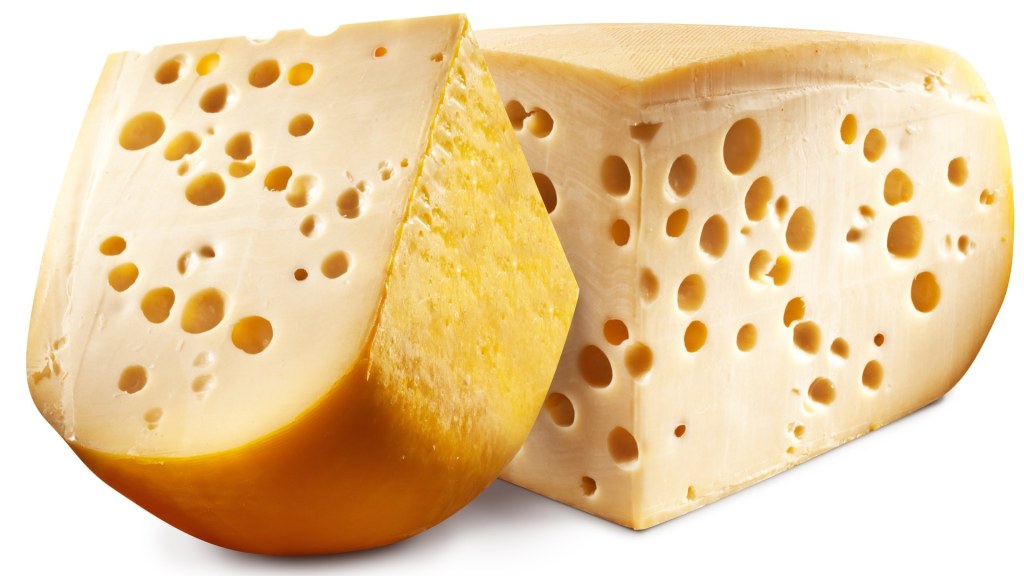Craving A Cheesy Conundrum? Emmentaler Vs Swiss: Unraveling The Battle Of Swiss Cheeses – Click Now For The Ultimate Showdown!
Emmentaler vs Swiss: A Comparison of Two Iconic Cheeses
Introduction
Greetings, Swiss Enthusiasts! In the world of cheese, few varieties are as renowned and beloved as Emmentaler and Swiss cheese. These two iconic cheeses have captured the hearts and palates of people around the globe. In this article, we will delve into the similarities and differences between Emmentaler and Swiss cheese, exploring their origins, production methods, flavor profiles, and more. So, grab a cheese knife, sit back, and join us on this delectable journey through the world of Emmentaler and Swiss cheese.
What is Emmentaler?
1 Picture Gallery: Craving A Cheesy Conundrum? Emmentaler Vs Swiss: Unraveling The Battle Of Swiss Cheeses – Click Now For The Ultimate Showdown!

🧀 Emmentaler, often referred to as the king of cheese, is a Swiss cheese with a rich history. It originated in the Emmental region of Switzerland, where it has been produced for centuries. Made from cow’s milk, Emmentaler is known for its characteristic large, walnut-sized holes, which are formed during the fermentation process.
How is Emmentaler made?

Image Source: chefsmandala.com
🧀 The production of Emmentaler involves traditional methods that have been passed down through generations. It starts with fresh raw milk, which is heated and then mixed with a bacterial starter culture. After the milk coagulates, it is cut into small pieces, allowing the whey to separate. The curds are then cooked and transferred into large molds, where they are pressed and aged for a minimum of four months.
What does Emmentaler taste like?
🧀 Emmentaler offers a distinct flavor profile that is both nutty and slightly sweet. Its texture is firm yet pliable, with a smooth and creamy mouthfeel. The cheese’s aging process intensifies its flavor, resulting in a complex and rich taste that is enjoyed by cheese connoisseurs worldwide.
Where can you find Emmentaler?
🧀 Emmentaler is available in specialty cheese shops and supermarkets across the globe. It is commonly used in a variety of culinary applications, including fondue, sandwiches, and cheese boards. The cheese’s distinct flavor and meltability make it a versatile ingredient in both savory and sweet recipes.
Who loves Emmentaler?
🧀 Emmentaler has a dedicated fan base that spans the globe. Cheese enthusiasts, foodies, and chefs alike appreciate the cheese for its exceptional quality and versatility. Whether it’s grated over pasta or enjoyed on its own, Emmentaler is a true crowd-pleaser.
When was Emmentaler first produced?
🧀 The precise origins of Emmentaler are difficult to pinpoint, but historians believe that its production dates back to the Middle Ages. The cheese gained popularity in the 19th century and has since become one of Switzerland’s most famous exports.
What is Swiss Cheese?
🧀 Swiss cheese, also known as Swiss Emmental, is another iconic cheese that hails from Switzerland. It shares some similarities with Emmentaler but also has its own unique characteristics. The cheese is renowned for its distinct flavor and holey texture, making it a favorite among cheese enthusiasts.
How is Swiss Cheese made?
🧀 Swiss cheese is made using a similar production process to Emmentaler. Fresh cow’s milk is heated and combined with a bacterial starter culture. After coagulation, the curds are cut, cooked, and placed in molds. The cheese is then pressed and aged for a minimum of three months.
What does Swiss Cheese taste like?
🧀 Swiss cheese offers a mild and slightly nutty flavor, with a hint of sweetness. Its texture is firm and smooth, and it features the characteristic holes found in Emmentaler. The aging process enhances the cheese’s flavor, resulting in a delightful taste that pairs well with a variety of foods.
Where can you find Swiss Cheese?
🧀 Swiss cheese is widely available in supermarkets and cheese shops worldwide. It is a popular choice for sandwiches, salads, and cheese platters. The cheese’s versatility and delightful taste make it a staple in many households.
Who loves Swiss Cheese?
🧀 Swiss cheese has a wide fan base that includes cheese enthusiasts, food lovers, and people of all ages. Its mild and approachable flavor appeals to a broad range of palates, making it a popular choice for both casual and gourmet dining.
When was Swiss Cheese first produced?
🧀 The production of Swiss cheese can be traced back to ancient times. However, it gained widespread recognition in the 19th century when Swiss immigrants introduced it to the United States. Since then, Swiss cheese has become a beloved staple in many cuisines around the world.
Advantages and Disadvantages of Emmentaler and Swiss Cheese
Advantages of Emmentaler:
🧀 Emmentaler offers several advantages that make it a sought-after cheese. Its nutty and slightly sweet flavor adds depth to various dishes, while its meltability makes it ideal for fondues and gratins. Additionally, Emmentaler is a good source of protein and calcium.
Disadvantages of Emmentaler:
🧀 Despite its many virtues, Emmentaler does have a few drawbacks. Its aging process can result in a higher price point compared to other cheeses. Additionally, some may find its flavor profile too strong or its texture too firm for their liking.
Advantages of Swiss Cheese:
🧀 Swiss cheese offers its own set of advantages. Its mild yet flavorful taste appeals to a wide audience, and its holey texture adds visual appeal to dishes. Swiss cheese is also a good source of nutrients, including calcium and vitamin B12.
Disadvantages of Swiss Cheese:
🧀 While Swiss cheese has numerous benefits, it also has a few downsides. Its aging process can result in a higher sodium content, which may be a concern for individuals on a low-sodium diet. Additionally, some may find its flavor too mild compared to stronger cheeses.
Frequently Asked Questions (FAQ)
1. Is Emmentaler the same as Swiss cheese?
🧀 No, Emmentaler and Swiss cheese are not the same, although they share similarities. Emmentaler is a specific type of Swiss cheese, known for its large holes and distinctive flavor.
2. Can I substitute Emmentaler with Swiss cheese in recipes?
🧀 Yes, you can substitute Emmentaler with Swiss cheese in most recipes. While they have slight flavor differences, the two cheeses are often used interchangeably. However, keep in mind that the flavor and melting characteristics may vary slightly.
3. Are Emmentaler and Swiss cheese lactose-free?
🧀 Both Emmentaler and Swiss cheese are considered to be low in lactose. During the cheese-making process, most of the lactose in the milk is converted into lactic acid. However, individuals with lactose intolerance should exercise caution and monitor their tolerance levels.
4. How do I store Emmentaler and Swiss cheese?
🧀 To ensure freshness, store Emmentaler and Swiss cheese in a cool, dry place. Wrap them tightly in wax paper or plastic wrap to prevent drying out. Alternatively, you can store them in a cheese container or airtight bag in the refrigerator.
5. Can I freeze Emmentaler and Swiss cheese?
🧀 While it is possible to freeze Emmentaler and Swiss cheese, it may affect the texture and flavor. Freezing can cause the cheese to become crumbly or lose some of its original taste. It is best to consume the cheeses within their recommended shelf life for optimal enjoyment.
Conclusion
In conclusion, Emmentaler and Swiss cheese are two iconic varieties that have captured the hearts of cheese lovers around the world. While they share similarities in terms of production methods and flavor profiles, each cheese has its own unique characteristics. Whether you’re a fan of Emmentaler’s nutty richness or Swiss cheese’s mild and holey texture, both cheeses offer a delightful culinary experience. So, next time you’re assembling a cheese platter or melting cheese into a dish, consider the distinct qualities of Emmentaler and Swiss cheese for a truly memorable gastronomic adventure.
Final Remarks
🧀 In writing this article, we have strived to provide you with valuable insights into the world of Emmentaler and Swiss cheese. However, it’s important to note that taste is subjective, and preferences may vary. We encourage you to explore both cheeses yourself and discover your personal favorites. Whether you choose Emmentaler or Swiss cheese, rest assured that you’re indulging in a timeless culinary delight. Happy cheesemaking and cheese tasting!
This post topic: Swiss



